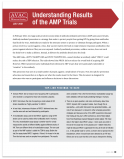- About UsOur Story, Our Team & Support Information
- What We DoAdvocacy to Achieve the End of AIDS
- Advance HIV/SRH Integration
- Advocate for Access to High-Impact Prevention
- Improve Research Conduct
- Product Innovation & Availability
- Promote Effective HIV Prevention Policy
- Strengthen Global Advocacy Networks
- Track and Translate the Field
- Our FocusInterventions to End the Epidemic
- ResourcesPublications, Infographics, Events & More
- MediaInformation & Resources for the Press
- Our BlogPrevention News & Perspective
Research on broadly neutralizing antibodies (bNAbs) is taking HIV prevention science in new directions, with implications for new prevention interventions and vaccine development.
Antibodies are produced by the immune system to clear infected cells and pathogens in the bloodstream. Antibodies can also be reproduced in a lab or manufactured and given to people.
Broadly neutralizing antibodies (bNAbs) against HIV develop naturally in some people after many years of living with HIV, but far too few and too late to provide benefit for that individual. Those same bNAbs might still be effective for prevention and in fact, scientists have been able to isolate bNAbs that are highly effective at neutralizing different strains of HIV, at least in the lab. These bNAbs typically target sites on the surface of the virus that are especially slow to mutate. At these sites, bNAbs bind to the virus and block it from attaching and infecting cells in the body.
Once one of these highly effective bNAbs is identified it can be reproduced—either in the lab or via small-scale manufacturing—in sufficient quantities to do a trial to see if the neutralization seen in the lab translates to preventing HIV infection in people. In the prevention trials to date, the antibody is delivered via infusion or injection. This is a form of what is known as passive immunization. Passive immunization provides an immune response as opposed to immunization via a vaccine, which teaches the body to make a response.
The most advanced clinical research on bNAbs for HIV prevention, the AMP study, is evaluating VRCO1 via infusion to test if it protects against HIV infection. Dozens of other bNAbs are in earlier phases of research.
What We're Reading
Featured Resources


